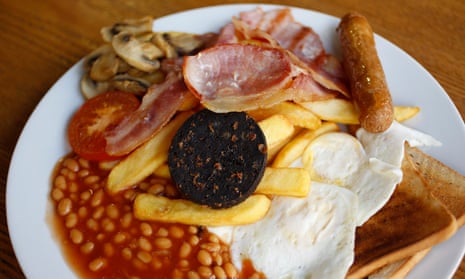Shoppers would be forced to pay £3 more for a traditional British fry-up if the government fails to secure a trade deal with the EU, piling more pressure on already cash-strapped consumers.
A typical basket of ingredients for a family breakfast could rise by almost 13% from £23.59 to £26.61 according to a report by KPMG.
The accountancy firm warned households would face above-inflation price rises for imported breakfast classics such as olive oil, bacon and orange juice if Britain left the EU without a deal and defaulted to the World Trade Organisation’s (WTO) customs rules.
It estimated that a 79p litre of orange juice from Spain and bottled in Ireland would rise to 93p, and a 300g pack of Danish bacon would increase from £2 to £2.18. In other examples a litre of Italian olive oil would jump from £3.60 to £4.68.
A 500g pack of French butter would rise by a quarter to £4.08. Butter prices are already at an all-time high, up 20% over the past 12 months, as farmers and dairies struggle to cope with demand.
Consumer budgets are under mounting pressure as the sharp fall in sterling’s valuesince the Brexit vote last year pushes up the prices of goods imported from abroad and drives shop prices higher. The pound is currently trading at about $1.29, 13% lower than it was on the day of the June 2016 referendum.
As a result, inflation has risen rapidly, from 0.3% in May last year to a four-year high of 2.9% in May this year. Meanwhile wage growth is weak, intensifying the squeeze on household finances.
“WTO tariffs could have a significant impact on both consumers and retailers alike – totting up consumer price tags and further squeezing retail margins,” said Bob Jones, director at the accountancy firm. “It’s important to remember that our analysis does not even reflect the steep costs consumers and retailers are already facing as a result of the pound sterling’s devaluation or the costs of any new non-tariff barriers.”
KPMG said that if no deal was struck on or before March 2019, two years after the UK triggered article 50, imported food and drink items would be among those hardest hit by increased tariffs.
“If the UK leaves the EU without a trade deal or transitional agreement, we can expect both higher prices and a huge spike in red tape at the borders,” Jones said.
“The top priority for businesses is to fully understand their own supply chains: the volumes and values of the goods they ship back and forth and which countries they’re importing to and from.”
KPMG made the calculations by taking the cost of mid-range ingredients of a fry-up from a UK supermarket and applying the current EU external customs tariffs to each product. It also took into account the grocer’s price mark-up.
Milk, free range eggs and sliced white bread were all sourced from the UK in the analysis, and were therefore free from additional tariffs.
Paul Martin, UK head of retail at KPMG, said that while supermarkets had so far avoided fully passing on higher prices to customers, this would change if the UK leaves the EU without a deal.
“The British consumer has become accustomed to seasonal produce all year round and has binged on a diet of discounts for some time.
“Shoppers could be forgiven for overlooking the significant impact customs will have on the prices they pay at the till. However, against a backdrop of increasingly squeezed margins, it is unlikely retailers will be able to hold the flood on higher costs indefinitely.”
Last week Michel Barnier, the EU’s chief Brexit negotiator, said Britain has more to lose than the EU if it walked away without a deal.
“In practice, ‘no deal’ would worsen the ‘lose-lose’ situation which is bound to result from Brexit. And the UK would have more to lose than its partners,” Barnier said.

Comments (…)
Sign in or create your Guardian account to join the discussion